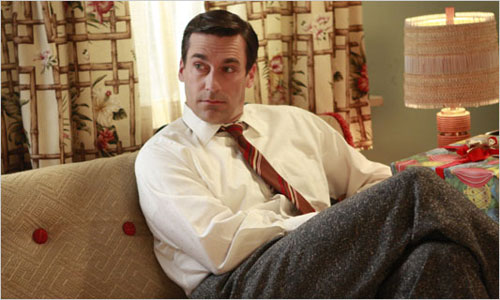The most memorable scene of last season’s “Mad Men” finale is the one in which Don Draper breaks down in the middle of an otherwise perfect pitch to Hershey’s. Many have described this scene as a breakthrough for the character, a moment in which a man whose life is defined by deception unexpectedly drops his mask and acknowledges his own failings. It’s easy enough to see this as a first step on the road to recovery for Don, who – for the entirety of this season at least – spiraled further and further downward, dragging his personal and professional relationships with him.
On second, third and probably fourth viewing, the scene remains stunning. Perhaps it’s so jarring because it is difficult to pinpoint exactly what triggers Don’s sudden confession. Having essentially hit the ball out of the park, he is halfway between third base and home when he stumbles over something unsaid that only he can account for. Is it the drinking? Is it withdrawal? Is it looking across the conference table at Ted struggling to do better by his family and colleagues? Maybe Don is merely tired of wearing a snug suit of half-truths.
It occurred to me while rereading printed reactions to this scene – most of them enthusiastic – that there is a wholly different way to react to this moment, the way that I remember reacting the very first time I watched it. It goes back to that botched home run. Seconds prior to him uttering the word “whorehouse” to a bunch of stodgy chocolate executives clutching purse strings, this was the old Don Draper. This was the Don Draper who could walk into a boardroom or stare down clients through the clear bottom of a glass of scotch and tell them exactly what they wanted, what they needed. This was the guy who had made advertising sexy. And as his once-glorious career had been stalling for what seemed like forever, it was thrilling to see him finally be good at his job again.
I am almost embarrassed to admit that, until Don was pushed out of the office by the other partners, I was secretly hoping his extreme vulnerability – while surely not a deliberate gambit – would somehow have swayed the Hershey’s suits even more and locked the account down completely. Alas, the pitch did not pan out, and we were left with the picture that the old Don simply could not persist. In the final scene of that episode, he takes his children to the decrepit home, the aforementioned whorehouse, where he grew up, shattering Sally’s existing perception of her father. She looks up at him and sees him differently, as I suppose we are also meant to do.
Don is an alcoholic. As such, there is plenty of precedent stating that part of his recovery should involve avoiding the circumstances that contribute to his addiction. Drinking brown liquor on television looks cool, as does smoking, wearing the hell out of a suit, and being devilishly adept at picking up women. But for me, Don could abandon any and all of these peripheral trappings if it means that Sally will not be traumatized any further. I think we all agree that the future well-being of the Draper children is the highest stake hanging on his potential redemption.
But if the old Don Draper was a complete package – a hard-drinkin’, skirt-chasin’ ad man – are we to infer that his status as preeminent pitchman must go out the window along with his other damaging behaviors? Sure, advertising is just a job and, presumably, anyone can do it sober. But, what about Freddy Rumsen, the show’s other notorious drunk? He only pissed himself to get nudged out the door. According to Sterling, Don Draper “shit the bed.”
What difference does it make? You may ask. It’s only a job. If dropping out of this lucrative but blighted world of advertising means he’ll get sober and be a better father and husband, isn’t that a small price to pay? (In other words, the flip of Matthew 16:26: “For what will it profit a man if he gains the whole world and forfeits his soul?” Back-to-back scenes earlier in the finale where Don runs afoul of men of the cloth imply that, yes, his soul somehow wavers in the balance.)
Some of the choices that Draper has made to get to where he is professionally can be called cowardly. Others could even be called malicious. But I have never doubted that he is, ultimately, where he should be. Don Draper is a guy who sells one group of people’s stuff to another group of people. By its nature, that could be an easily overlooked vocation. But the old Don Draper elevated it. In those initial episodes, before the show’s primacy was established, his somber yet dazzling presentations were what kept me riveted. Maybe right now, his soul is ugly. But in a pitch meeting, he used to be beautiful.
So much has been and will be written about what crafting a satisfying arc for this antihero would entail. Some suggest he might have to die. For me, it’s much simpler and less morbid. I’d love to see him adapt to the world as it changes around him – as that is a significant part of the backdrop of the show – and survive. But mostly, I’d like to see him hold on to that piece of the old Don that made me love the character in the first place.
(The first half of the final season of “Mad Men” begins tonight on AMC.)

